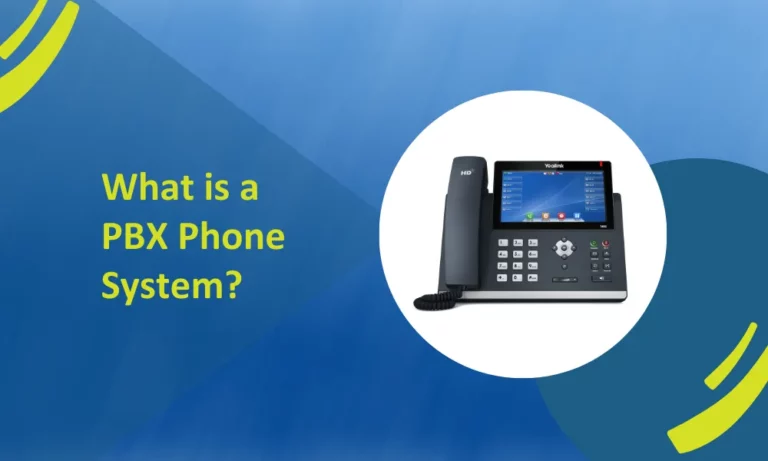You might already be knowledgeable about VoIP if you have experience with Skype, WhatsApp, or Zoom.
Voice over Internet Protocol (VoIP) allows users to make calls over the Internet rather than traditional phone services, transforming business communications with customers and employees. Despite its benefits, the increasing popularity of this technology raises questions about what a VoIP phone system is, how it operates, and its compatibility with your company’s IP network.
What are the advantages of using a VoIP phone system?
VoIP phone systems offer cost savings, flexibility, scalability, and advanced features like call routing and virtual numbers. They also enhance collaboration with mobile integration and video conferencing. Plus, VoIP provides better call quality and reliability compared to traditional phone systems.
What is VoIP?
Voice over Internet Protocol allows calling and texting over an internet connection instead of traditional telephone lines or service providers.
By downloading an application on a current device or buying dedicated equipment, VoIP phone systems can be utilized in any location with internet connectivity. This technology provides users with a variety of features that are unavailable on traditional phones.
How does a VoIP phone system work?
VoIP phone systems work by transmitting data over the internet — rather than a cellular provider — to allow users to engage in voice calls and text conversations.
The process of VoIP includes converting voices into data packets and promptly transmitting them to the designated recipient through IP addresses. To break it down, the process unfolds as follows:
- Step 1: Your VoIP phone or software is connected to the internet and sends or receives a call.
- Step 2: Your voice is compressed into digital data by your VoIP service provider and is sent to the other line via your internet connection.
- Step 3: The other line receives the data, which is instantly uncompressed and turned back into the sound of your voice.
All of these steps happen in the blink of an eye, and communication happens seamlessly, just as it would with a regular phone — that is, as long as there is a strong internet connection.
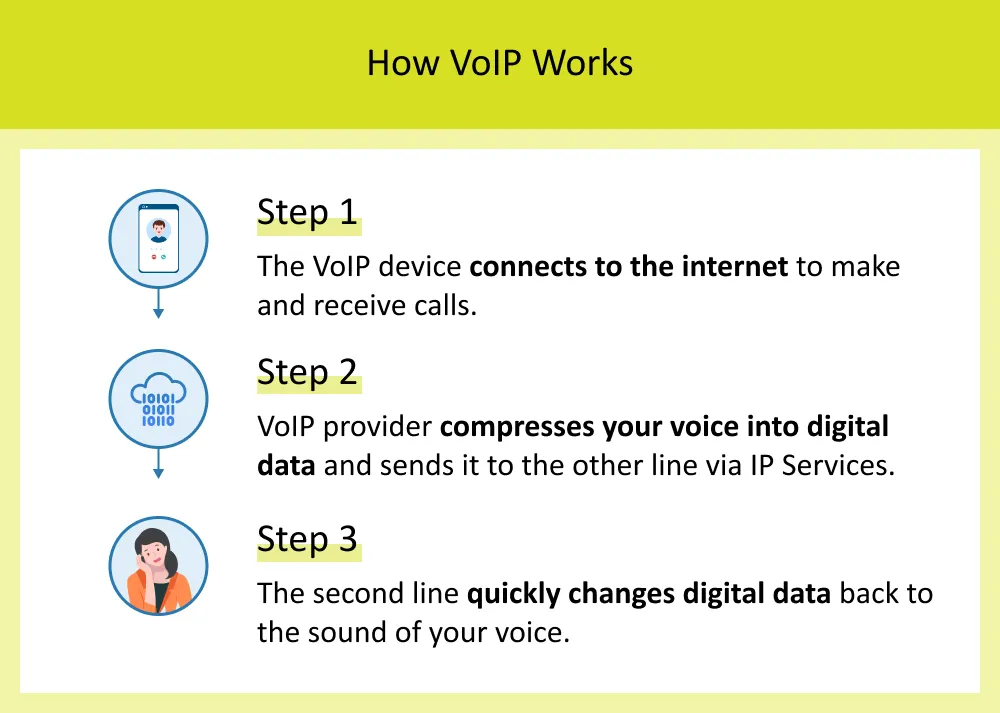
Top features of VoIP phones
There are a number of advantages that set VoIP phone systems apart from normal telephone providers. Some of the top features include:
- Lower plan cost: VoIP providers offer more affordable monthly plans compared to traditional telephone service providers due to routing calls over the internet. This cost-saving advantage stems from not requiring telephone lines or physical maintenance, allowing VoIP companies to pass on the savings to consumers.
- Lower equipment cost: One of the key benefits of VoIP is the option to utilize the service through an application on current devices, eliminating the need to acquire numerous physical phones for your team.
- Increased call quality: Traditional phones and landlines are generally dependable, but they may encounter interruptions and connectivity problems that VoIP does not. If there is a steady internet connection, VoIP calls will surpass traditional telephone calls in terms of quality.
- Unique features: VoIP services offer distinct features not found in traditional providers. For instance, users can establish auto attendants or virtual receptionists to enhance communication within their organization. Moreover, VoIP services provide mobile and desktop app choices to keep your team connected at all times.
- Work from anywhere: The majority of leading service providers provide applications for VoIP calling on various devices. Users can simply open the app on a phone or computer to be connected instantly to their work number, offering businesses flexibility for mobile sales. forces or remote teams.
- Call security: VoIP conversations are more secure and confidential when transmitted through IP systems rather than traditional phone lines. Additionally, numerous VoIP providers enhance security by encrypting call data to ensure the safety of all network calls.
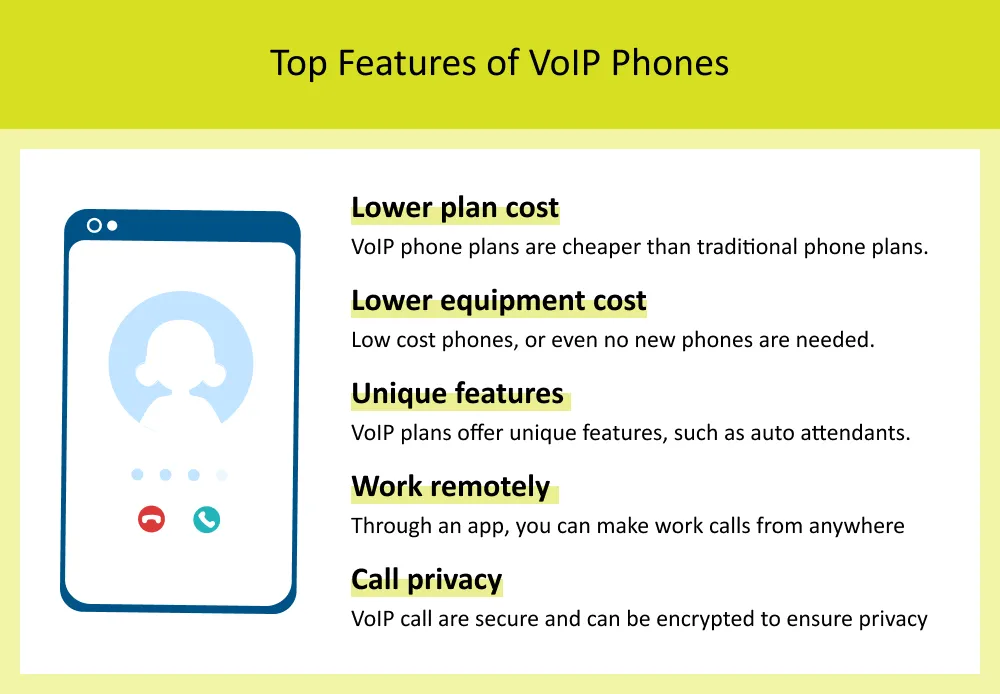
What is the difference between VoIP and a regular phone?
VoIP phone systems and traditional phones share many functions, yet they differ significantly in features, capabilities, and cost.
VoIP phone systems provide service over the internet, delivering high call quality with a reliable connection. Start-up costs vary from low to high, depending on the circumstances. Businesses opting to use VoIP service on current devices using an app or software will have minimal start-up expenses. Conversely, those purchasing new VoIP phones and hardware may face higher costs. Yet, with the growing accessibility of internet services, VoIP phones are increasingly seen as a cost-efficient and effective choice for businesses seeking to enhance their phone systems. Additionally, there are numerous benefits to using VoIP systems over traditional landline phones, such as lower costs and high call quality.
Traditional phones provide service via cellular data and phone lines, with call quality subject to signal strength and line conditions in the vicinity. Initial costs can vary from moderate to high based on the required equipment and number of lines.
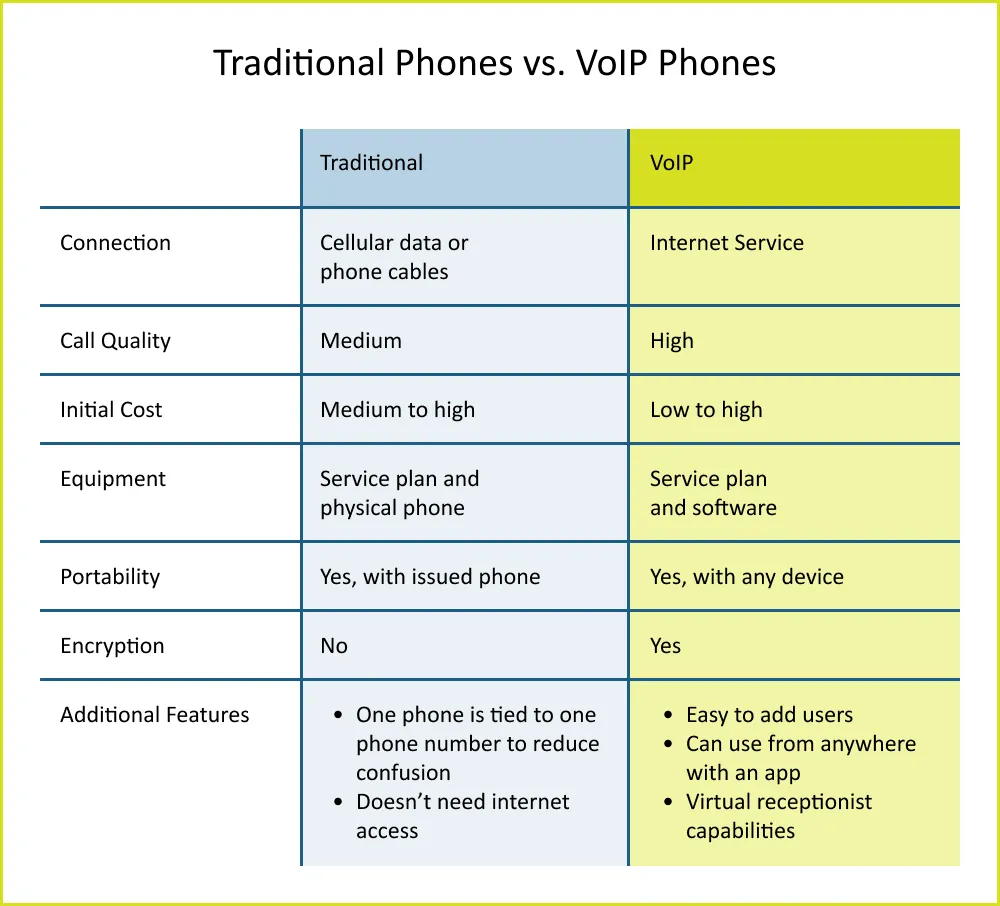
Equipment needed for a VoIP phone system
Setting up a VoIP phone system requires several essential items.
Strong internet connection
Whether the phone is connected via a hardline to a modem or router, or linked to a wifi signal, having a reliable internet connection is crucial for a VoIP phone system. As the system operates over internet protocol, a poor signal can lead to call disruptions and overall inefficiency. Hence, maintaining a strong connection is essential, whether you are at the office or traveling.
Service provider
Once you have set up a reliable internet connection, the next step is to choose your VoIP service provider. Similar to large mobile network companies, VoIP providers link your phone to other lines, manage your data, and guarantee the smooth exchange of information. With various providers available, it is essential to pick the most suitable one that aligns with your budget and requirements for your VoIP number. It is also important to ensure that your network equipment, such as modems, routers, and ethernet cables, are compatible with your chosen service provider.
Softphones
Installing a softphone is the initial choice for making VoIP calls.
Softphones are software-based that can be installed on your computer or existing telephone. This software is typically provided by your VoIP provider and allows you to have a virtual phone number that can be accessed from any device.
When planning to utilize a softphone for your VoIP service, consider which provider offers the most user-friendly mobile app.
Hardphones
Another choice for making VoIP calls is to buy a hardphone.
Hardphones are tangible tools that allow users to connect to their VoIP phone number, spanning from stationary phones to mobile devices, providing a similar experience to conventional landlines. While pricier than softphones, they offer practicality in professional settings.
Price differences between VoIP and regular phones
When choosing between a VoIP service provider and a conventional phone carrier, it’s important to consider some price discrepancies.
If you opt for using softphones, installing VoIP phone systems is free. The monthly cost per user is affordable and tends to decrease with more employees requiring VoIP services. In contrast, choosing hardphones like desk phones will result in higher expenses for VoIP equipment compared to regular telephones.
Regular phones might require an installation fee if your office is not set up for the service, and each physical phone can cost between $50 – $100. Although the equipment cost is usually cheaper compared to VoIP phones, the annual total cost for each line’s monthly service fee can be higher than using VoIP services.
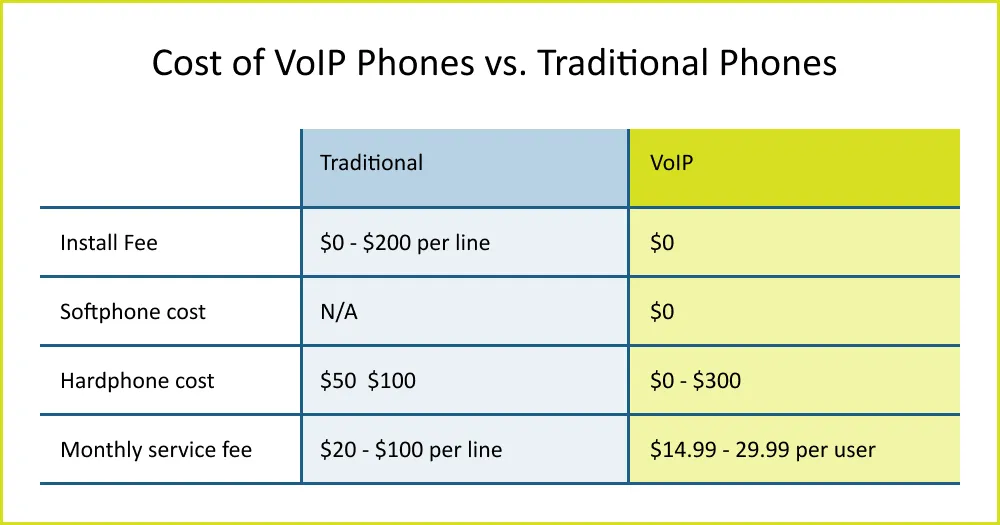
Is VoIP a smart choice for your businesses?
Opting for VoIP phone systems can be a wise decision for businesses looking to enhance communication company-wide.
Employees using these systems can conveniently handle calls from a work number at any location with a stable internet connection. VoIP technology enables businesses to utilize a single number for business calls regardless of their location, providing enhanced flexibility and accessibility for those with internet access. Moreover, businesses can enjoy cost savings compared to traditional phone systems, leading to improved profitability. Additionally, they benefit from enhanced security, call quality, and exclusive features not available with traditional phones. With the ability to easily add or remove users and assign new phone numbers, VoIP is a smart choice for businesses looking to embrace the future of communication technology.
That said, would your business benefit from installing a VoIP phone system?
Additional VoIP FAQs
Here are a few other questions that come up when considering a switch to a VoIP service.
What does VoIP stand for?
VoIP stands for Voice over Internet Protocol, and it works by transmitting data over the internet rather than traditional telephone lines.
Why would someone use a VoIP phone?
VoIP phones are typically cheaper to set up and use, have better sound quality, and come with a number of features that you can’t find with regular phone plans.
Can you use a VoIP phone system like a regular phone?
Yes, you can use a VoIP phone as a regular phone.
VoIP phone systems work the same way as traditional telephones, the only difference being that VoIP uses the internet to transmit information. In fact, VoIP phones can be more reliable and have higher-quality audio than regular phones.
Partner with SoundCurve to streamline your business communications
Technology changes rapidly in the workplace, and business owners may be wondering what is a VoIP phone system — and whether it can help their operations. VoIP comes with a number of advantages that streamline communications for small businesses, but it may better serve some businesses to gain the benefits of VoIP without the extra work. Partnering with SoundCurve, a leading business phone service provider and private branch exchange expert, can help small businesses embrace the future and achieve success.


